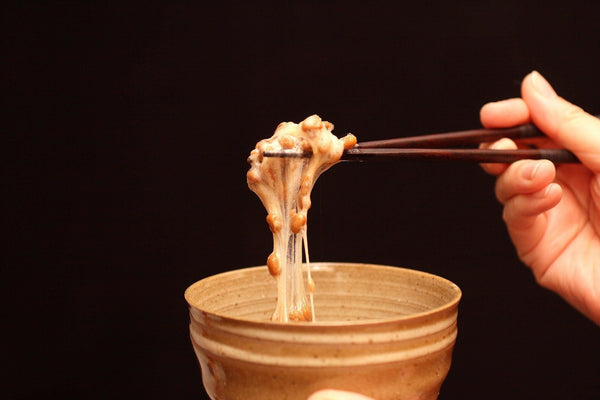
Jump to:
Nattokinase has emerged as a prominent subject in health discussions, particularly for its association with blood clot breakdown and heart health. Despite its prevalence in medical research, understanding the specifics of this enzyme can be challenging.
In this article, we delve into a comprehensive conversation with our in-house nutritionist, Mana Sobral, to demystify Nattokinase. The goal of this Q & A is to provide an accessible breakdown of this intriguing enzyme, enabling you to make informed decisions about its inclusion in your daily health regimen.
An Introduction To Nattokinase
Q: What is Nattokinase?
A: Nattokinase is an enzyme produced via the fermentation process by Bacillus subtilis natto, and it is commonly found within the thick and sticky consistency that develops when natto is stirred.
How Nattokinase Came To Be & How It Is Made
Q: What is the origin and production process of Nattokinase?
A: Nattokinase is naturally produced during the natto-making process, which involves soybeans and the addition of a specific bacterium named Bacillus subtilis natto.
The origin of natto is somewhat shrouded in mystery and leans more towards legend than documented history. One popular story suggests that someone stumbled upon it by accident. They were probably storing boiled beans wrapped in straw, and when they found that some beans had developed threads, they decided to taste them. To their surprise, they found the beans to be quite tasty. So, natto might just be a fortunate discovery in the world of fermented foods.
Nattokinase's Production, Uses & Benefits
Q: How is Nattokinase produced? What is it used for?
A: Nattokinase is produced through a fermentation process involving soybeans and the bacterium Bacillus subtilis natto. To create it, soybeans are first steamed, then mixed with this bacterium and left to ferment for approximately 24-48 hours at a controlled temperature. During this fermentation, Bacillus subtilis natto generates Nattokinase as an enzyme.
Q: What are its benefits?
A: After fermentation, the natto is usually dried to preserve the enzyme's activity and can be further processed into various forms, like powder or whole beans, for use as a dietary supplement or in Natto products. This is how Nattokinase becomes available for consumption.
Nattokinase possesses the remarkable ability to break down fibrin, a fibrous protein that plays a significant role in blood clot formation. By reducing fibrin concentration, it effectively prevents the formation of blood clots and abnormal blood coagulation. Moreover, it stimulates the production of plasmin, a crucial enzyme for maintaining blood fluidity. In simpler terms, it contributes to averting serious conditions such as arteriosclerosis, which is associated with major diseases like cerebrovascular and heart diseases, and thus plays a vital role in preserving your health.
Reasons For Consuming Natto?
Q: Are there any reasons why people should consider incorporating natto into their diets?
A: Natto is packed with Vitamin K2, thanks to the Bacillus subtilis natto bacteria it contains. This vitamin plays a vital role in assisting your bones in storing calcium, maintaining bone density, and lowering the risk of fractures. What's even more fascinating is the resilience of natto bacteria – they can endure heat and stomach acid, reaching your gut in a live state. Once there, they work to decrease the production of harmful free radicals and foster the growth of beneficial gut bacteria, providing you with some additional gut health perks.
Nattokinase & Side Effects
Q: Is Nattokinase safe to consume? Are there any side effects we should be aware of?
A: Absolutely, Nattokinase is considered safe for consumption. It is a natural ingredient extracted from soybeans. As long as you adhere to the recommended usage and dosage instructions provided on the supplement label, it generally does not exhibit any notable side effects.
In rare instances, nattokinase may not be suitable for specific individuals based on their constitution and health condition. If you encounter any unusual symptoms, it's crucial to discontinue its use immediately and seek advice from a medical professional.
Any Precautions To Consider Before Taking Nattokinase?
Q: Please share any precautions that readers should take before consuming Nattokinase.
A: Supplements, categorized as nutritional or dietary products, are designed to support overall health rather than treat or cure diseases. It's crucial to note that incorporating supplements into your routine without professional guidance may exacerbate existing medical conditions. Therefore, consulting a healthcare professional is essential before adding supplements to your diet, especially if you have specific health concerns or medical conditions:
- Natto, the source of nattokinase, contains Vitamin K2, known for its role in promoting blood clotting. Consequently, individuals prescribed medications to prevent blood clotting, such as those with heart conditions, may experience reduced effectiveness due to Vitamin K2. Exercise caution when considering nattokinase supplements. Some options have Vitamin K2 removed, but it's advisable to consult with a doctor before taking them.
- Given the limited information about the safety of nattokinase for pregnant and breastfeeding women, it is recommended to consult with a doctor or refrain from its use in such cases.
- Nattokinase has been associated with lowering blood pressure. Therefore, individuals with low blood pressure should consult with a doctor before incorporating it into their regimen.
- Due to its blood-thinning effects, individuals with bleeding disorders, those planning surgery, or those in the post-surgery phase should avoid taking nattokinase without professional guidance.
How Much Nattokinase Should I Take?
Q: What is the official dosage recommendation for Nattokinase?
A: Official authorities do not specify the recommended daily intake of nattokinase. The Japan Nattokinase Association suggests approximately 2,000 FU per day, equivalent to consuming 1-2 packs of natto daily. However, the reliability of this recommendation is uncertain, making it challenging to provide an exact figure. It is advisable to adhere to the recommended dose mentioned on the supplement label for clarity. When considering age-specific intake, particularly for minors, the guidelines may vary among supplement manufacturers. Therefore, it is essential to follow the specific guidelines provided by the supplement for accurate information.
Nattokinase & Cancer
Q: Can nattokinase cure cancer?
A: Unfortunately, there is no cure for cancer with any kind of food.
Taking Too Much Nattokinase
Q: Are there any precautions for taking too much nattokinase? Are there any adverse effects?
A: Generally, there are no adverse effects, but it's important to note that individual responses may vary. Conversely, excessive consumption of natto, the source of nattokinase, could potentially elevate the risk of developing gout due to an excess of purine. Additionally, an overabundance of isoflavones in natto may contribute to an increased risk of gynecological disorders.
Additional Nattokinase Tips
Q: How should nattokinase be stored?
A: It is recommended to store nattokinase supplements in a cool place as these supplements are sensitive to heat.
Q: Are There Any Foods That Contain Nattokinase?
A: The only methods of consuming nattokinase are either by consuming natto or by taking nattokinase supplements.
Q: Can you recommend a Nattokinase supplement to readers?
A: The vitamin K present in natto has blood-clotting effects, making it advisable for individuals with heart conditions taking anticoagulants to avoid natto. However, the Orihiro Nattokinase Natto Supplement 60 Capsules, is free from vitamin K. Despite this, it's crucial to consult with a doctor before taking the supplement, exercising caution. It's worth noting that what may be suitable for one person might not be the best choice for everyone.
Did we answer all of your questions about nattokinase? If we missed anything, be sure to let us know in the comments below.


0 comments